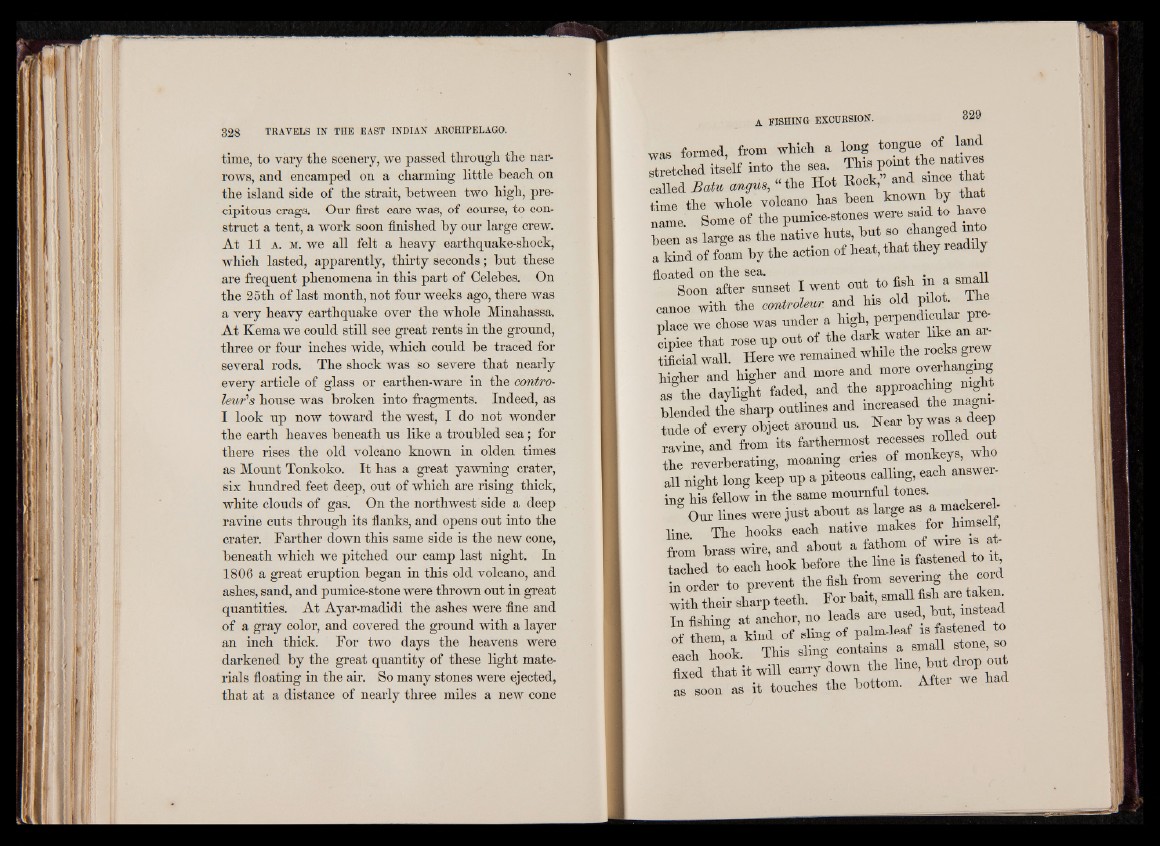
time, to vary the scenery, we passed through the narrows,
and encamped on a charming little beach on
the island side of the strait, between two high, precipitous
crags. Our first care was, of course, to construct
a tent, a work soon finished by our large crew.
At 11 a . m. we all felt a heavy earthquake-shock,
which lasted, apparently, thirty seconds; but these
are frequent phenomena in this part of Celebes. On
the 25th of last month, not four weeks ago, there was
a very heavy earthquake over the whole Minahassa.
At Kema we could still see great rents in the ground,
three or four inches wide, which could be traced for
several rods. The shock was so severe that nearly
every article of glass or earthen-ware in the contro-
lewr’s house was broken into fragments. Indeed, as
I look up now toward the west, I do not wonder
the earth heaves beneath us like a troubled sea; for
there rises the old volcano known in olden times
as Mount Tonkoko. It has a great yawning crater,
six hundred feet deep, out of which are rising thick,
white clouds of gas. On the northwest side a deep
ravine cuts through its flanks, and opens out into the
crater. Farther down this same side is the new cone,
beneath which we pitched our camp last night. In
1806 a great eruption began in this old volcano, and
ashes, sand, and pumice-stone were thrown out in great
quantities. At Ayar-madidi the ashes were fine and
of a gray color, and covered the ground with a layer
an inch thick. For two days the heavens were
darkened by the great quantity of these light materials
floating in the air. So many stones were ejected,
that at a distance of nearly three miles a new cone
was formed, from which a long tongue of land
stretched itself into the sea. This point the natives
called B atu cmgus, “ the Hot Rock,’ and since a
time the whole volcano has been known by that
name. Some of the pumice-stones were said to have
been as large as the native hnts, but so change m
a t o d of foam by the action of heat, that they readrly
floated on the sea. „ , • sm a l l
Soon after sunset I went out to fish in a sm
canoe with the conProlewr. and his old pi o .
place we chose was under a high, perpendicular precipice
that rose up out of the dark water like an
tificial wall. Here we remained while the rocks g |
higher and higher and more and more
as the daylight faded, and the
blended the sharp outlines and j B H P y
tude of every object around us. Hear by V
ravine and from its farthermost recesses rolled ou
the reverberating, moaning cries of m0^ ; ^ er°_
all night long keep up a piteous calling,
insr his fellow in the same mournful tones.
Our lines were just about as large as a
line The hooks each native makes for^ hims ,
from brass wire, and about a fathom of wire i*^ attached
to each hook before the line is j
in order to prevent the fish from severing the cor
with their sharp teeth. F o r bait,
In fishing at anchor, no leads are used, but, mste
of them, a kind of sling of palm-leaf *
each hook. This sling contains a small ston ,
L t , it will carry down the line, but drop ou